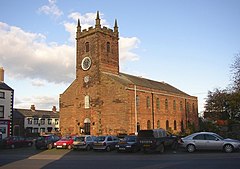Wigton
| Wigton | |
|---|---|
 St. Mary's Church |
|
| Wigton shown within Cumbria | |
| Population | 5,831 (2011) |
| OS grid reference | NY255481 |
| Civil parish |
|
| District | |
| Shire county | |
| Region | |
| Country | England |
| Sovereign state | United Kingdom |
| Post town | WIGTON |
| Postcode district | CA7 |
| Dialling code | 016973 |
| Police | Cumbria |
| Fire | Cumbria |
| Ambulance | North West |
| EU Parliament | North West England |
| UK Parliament | |
Wigton is a market town in Cumbria, England. Historically in Cumberland, it lies just outside the Lake District in the borough of Allerdale. Wigton is at the centre of the Solway Plain, between the Caldbeck Fells and the Solway coast. It is served by Wigton railway station on the Cumbrian Coast Line, and the A596 road to Workington. The town of Silloth-on-Solway lies twelve miles to the west, beyond Abbeytown.
Wigton is "Wicga's tūn" "Tūn" is Old English for "homestead" or "village", so Wigton is "the hamlet belonging to Wicga".
On the Wiza and Wampool becks (dialect word meaning "brook" or "stream" – from the Old Norse bekkr), the market town of Wigton is an ancient settlement and evolved from a pre-medieval street plan, which can still be traced today.
The Romans had a cavalry station, Maglona, known locally as Old Carlisle, just to the south of the town with a large Vicus (civilian settlement) associated with it. From the location they could react to incursions from North of Hadrian's Wall, using the old Roman road to sally east or west before traversing northward across the countryside. In the period of late antiquity after Roman rule, Wigton was within the native British kingdom of Rheged. Probably of Anglian origin, Wigton was an established settlement in the Kingdom of Northumbria long before the Normans arrived in the area. Wigton and most of then Cumberland were a part of Scotland in 1086 when the Domesday Book was written for William I, so are not included in it.
...
Wikipedia

